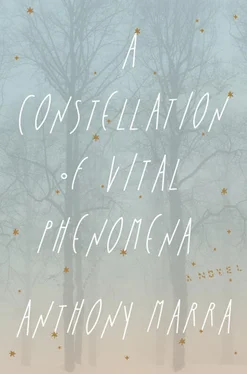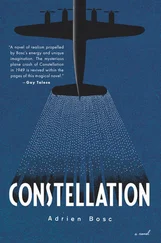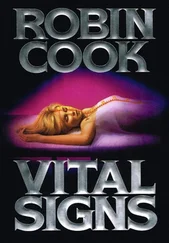That morbid association between the cannibal and the nutcracker, one which she never mentioned to Natasha, was all she thought of while searching for the portrait. She finally found the notebook on the canteen counter, beneath a stack of folded linens. From the last page Natasha observed her calmly, through eyes unclouded by judgment or resentment, her hair held back with a headband she had never owned, her ears heavy with earrings that didn’t exist. Clearly Akhmed hadn’t met her.
Her footsteps, slowing to a processional as she neared her room, tapped like the last drops falling from a stopped faucet. She wanted to know and didn’t want to know; the two were always there, always tearing at her, a tug-of-war in which she was the rope. But that was okay, she told herself. The truth was one more rumor passed along the refugee lines, another hallucination she could freely disbelieve. When she entered the room the girl was already asleep. She slid the portrait into one of the drawers, thankful to postpone the answer for one more night.

THE SECOND WAR, when it came to Volchansk, came without bomb blasts or mortar rounds, tracer bullets or tank treads. It came through the bazaar at first, a few more kopeks per gram of cardamom, a few more rubles per carrot, the deprivation subtle enough to blame on currency inflation, or global markets, or natural disasters. Then the electricity went. But the municipal power lines, restrung after the first war, never had carried a current for more than two hours at a stretch anyway, as likely to come at daybreak as midnight, fifteen or twenty minutes for Natasha to charge her batteries, pull news from the airwaves, hop in the shower and blow-dry her hair before the lights flickered and the city collapsed back into darkness. The tap water went next. With the remaining civilians she drew buckets from unboarded wells and strained the water through pillowcases before boiling it. Then food shortages. No milk, then no plums, then no cabbages, then no corn meal. Even the feral animals quieted, the dogs stopped howling, the songbirds stopped singing. And though Federal forces invaded Chechnya in August 1999, the second war didn’t begin for Natasha until the afternoon in 2001 when it marched through the doors of Hospital No. 6.
The skies of the maternity ward mural were as placid as on the day she had drawn them when she mistook the first crack for thunder. Gunshots followed as quickly as her footsteps as she ran downstairs. In trauma, Sonja and the nurses huddled by the aluminum filing cabinets.
“We could evacuate them to a village,” Sonja suggested. “We have a truck.”
“No,” Deshi said. “We keep them here. This is a hospital. They belong here.”
Maali assented. “Let’s use them as human shields.”
Natasha tried to wedge herself into the conversation, but as usual the triangle wouldn’t widen into a square. She took a deep breath and turned. This isn’t about you, she told herself. Your reaction is the only thing you can control. Who would have thought those books Sonja had brought with her the day she found ice were worth reading? In the five years she had worked here her emotional spectrum expanded beyond the monochromatic depression that had tinted her early days of recovery. Recovery . What a strange, wondrous word. None better defined her gradual reintegration into humanity. Nearly nine months of confinement, forced prostitution, beatings and heroin addiction, but she had come back. No one was more surprised than she herself, and no one was happier than Sonja. When Natasha was a teenager she once fell asleep on the roof and woke the color of borscht. The following week all the popular girls at school came in sunburned, and a week later the girls that wanted to be popular, until the principal, in an impromptu assembly, explained that girls had been known to roast alive while sunbathing. The memory was still there, tucked away in folds of time, and she found it again, with a smile, on the afternoons she climbed to the hospital roof to lie in the sun. Entire hours passed without her once thinking of Italy.
The nurses didn’t want to hear from her, but the patients did. An elderly woman, Xenia, patient number 29395, repeatedly asked what is happening , more confused and hesitant with each reiteration, as her neighbor, her first cousin, begged her to shut up because her insufferable voice would kill him faster than any bullet or bomb. When the Whites had swept through Volchansk eighty-one years earlier, Xenia had asked her cousin the same question and her cousin had answered. Xenia had been six, her cousin seven. Her voice had been lovely then.
“We’re figuring it out,” Natasha said. “Don’t worry. Can I get you some ice?”
Xenia gave her cousin a smug smile and nodded.
“Bring me the tongue depressor!” the cousin shouted after Natasha.
Two days earlier, when Xenia had arrived with pneumonia, Sonja had treated her lungs with the respect a plumber shows to blocked septic pipes. Her sister’s work was undeniably good, but its execution bothered Natasha. To work in these circumstances a surgeon must reduce each patient to her body, but this was an attitude shared by the traffickers, pimps, and johns populating Natasha’s private perdition. So while Sonja examined a cracked pelvis without once meeting the patient’s eye, or addressed the patient by placard number rather than by name, Natasha sequestered herself in the fourth-floor maternity ward, where whole days passed without their paths crossing, where the wails of newborns reminded her that life is louder than its pulse. While Sonja debated the merits of evacuation, Natasha fed Xenia crushed ice with a plastic spoon and told her exactly what was happening.
Boot fall, echoing down the corridor, ended the debate. The security guard ran through the double doors, his arms pumping, his shirt-tail flapping behind him. “They’re here,” he called. He ran right past Sonja and out the back door, announcing his immediate resignation in a breathless shout.
“Who?” Sonja called after him. “Feds or rebels?” No answer. Xenia held an ice cube in her mouth, afraid to break it. No one spoke. The shuffle of military boots paused at the closed double doors. The air was stretched so taut Natasha could have walked across it. A sharp kick, initially mistaken for a gunshot, jolted them all and flung open the double doors. Four bearded men entered with machine guns raised.
“I retired seven years ago,” Deshi said to no one in particular.
“We hereby liberate this hospital for patriotic use for the glorious campaign for national independence,” the shortest rebel declared. Dirt powdered his cheeks. Blood stained his shirt and trousers. He glared at the room, daring them to blink. “Who’s in charge?”
Across the room, with an exasperated roll of her eyes, Sonja raised her hand.
“I am the field commander of the fourth brigade of the National Military of the Chechen Republic of Ichkeria,” the shortest rebel said. He lowered his gun and took small, plodding steps to Sonja. “There are forty of us. Most need medical attention. Everyone needs food and water.”
“We could amputate all their legs,” Maali suggested, but the limping entrance of thirty-six more rebels made permission a formality. Sonja agreed to treat the wounded provided they removed their boots. They corralled the rebels in one of the ghost wards, sharing an unspoken consensus that the quicker the work was done, the better for all involved. The rebels asked for treatment by ascending order of rank, rather than by triage. The lower ranks were first into battle, the commander explained in a clipped northern accent, and thus had suffered the longest. Natasha’s throat tightened as she cut through the trouser leg of a curly-haired private. Nothing but pale down on his cheeks and pink clouds in his eyes. She hadn’t touched a man’s trousers in five and a quarter years.
Читать дальше












